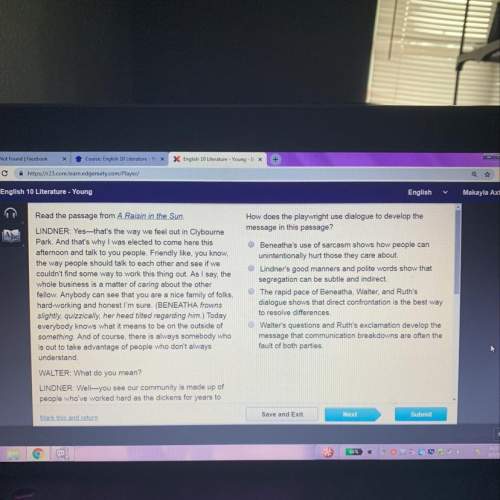
English, 21.04.2021 04:40 rickevaaaa
PLEASE HURRY
Read this passage from chapter 5 of The Prince.
There are, for example, the Spartans and the Romans. The Spartans held Athens and Thebes, establishing there an oligarchy: nevertheless they lost them. The Romans, in order to hold Capua, Carthage, and Numantia, dismantled them, and did not lose them. They wished to hold Greece as the Spartans held it, making it free and permitting its laws, and did not succeed. So to hold it they were compelled to dismantle many cities in the country, for in truth there is no safe way to retain them otherwise than by ruining them. And he who becomes master of a city accustomed to freedom and does not destroy it, may expect to be destroyed by it, for in rebellion it has always the watchword of liberty and its ancient privileges as a rallying point, which neither time nor benefits will ever cause it to forget. And whatever you may do or provide against, they never forget that name or their privileges unless they are disunited or dispersed, but at every chance they immediately rally to them, as Pisa after the hundred years she had been held in bondage by the Florentines.
What text evidence supports Machiavelli’s secondary purpose to inform readers about the tactics Sparta and Rome used to hold cities and their effectiveness? Select three options.
the list of cities conquered by Sparta and Rome
the description of how Sparta had held Greece
the explanation of why Rome dismantled Greek cities
the characterization of liberty as a “watchword” of rebellion
the example of Pisa rebelling against the Florentines

Answers: 3
Another question on English

English, 21.06.2019 16:00
What is the “narrow cell” in line 15 of “elegy written in a country churchyard”
Answers: 2

English, 22.06.2019 01:00
Read the excerpt from act 1 of a doll's house. helmer: nora! [goes up to her and takes her playfully by the ear.] the same little featherhead! suppose, now, that i borrowed fifty pounds today, and you spent it all in the christmas week, and then on new year's eve a slate fell on my head and killed me, and— nora: [putting her hands over his mouth]. oh! don't say such horrid things. helmer: still, suppose that happened, —what then? nora: if that were to happen, i don't suppose i should care whether i owed money or not. helmer: yes, but what about the people who had lent it? nora: they? who would bother about them? i should not know who they were. helmer: that is like a woman! but seriously, nora, you know what i think about that. no debt, no borrowing. there can be no freedom or beauty about a home life that depends on borrowing and debt. we two have kept bravely on the straight road so far, and we will go on the same way for the short time longer that there need be any struggle. nora: [moving towards the stove]. as you , torvald. how does the interaction between helmer and nora advance the plot? nora realizes that helmer will completely disapprove of her having borrowed money, so she has to continue to keep it a secret from him. nora realizes that she and helmer have the same ideas about financial issues, and the conversation brings them closer together later in the play. helmer realizes that nora is more responsible with money than he originally thought, and he trusts her more with finances later in the play. nora realizes that helmer knows a lot more about borrowing and lending, and she will seek his input later when she needs it.
Answers: 1

English, 22.06.2019 09:00
In the reading, i know why the caged bird sings, marguerite views mrs. flowers as a larger than life personality. which quote from the text most strongly supports how marguerite views mrs. flowers? question 18 options: a) “i’ll accept no excuse if you return a book to me that has been badly handled.” b) “you see, i had planned to invite you for cookies and lemonade so we could have this little chat.” c) “there was a little path beside the rocky road, and mrs. flowers walked in front swinging her arms and picking her way over the stones.” d) “somehow i had never connected mrs. flowers with food or eating or any other common experience of common people.”
Answers: 2

English, 22.06.2019 14:00
In at least one hundred words discuss how the theme of universality is expressed in out town
Answers: 1
You know the right answer?
PLEASE HURRY
Read this passage from chapter 5 of The Prince.
There are, for example, t...
There are, for example, t...
Questions




Biology, 22.09.2020 05:01









Mathematics, 22.09.2020 06:01


Mathematics, 22.09.2020 06:01


History, 22.09.2020 06:01

Biology, 22.09.2020 06:01

Computers and Technology, 22.09.2020 06:01





